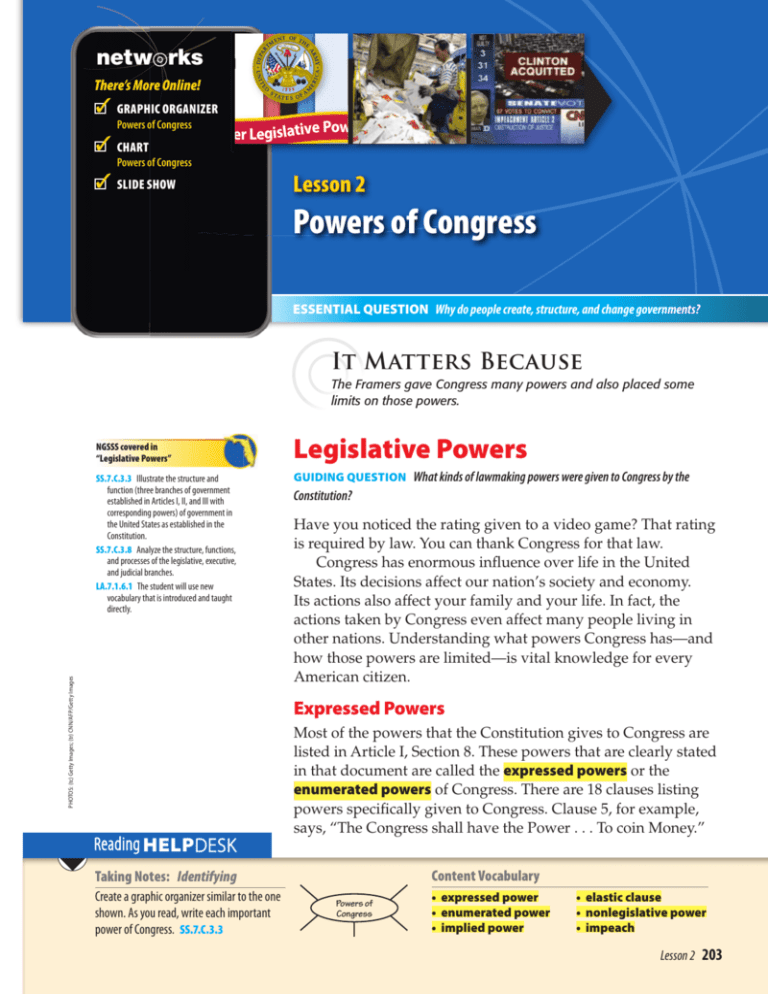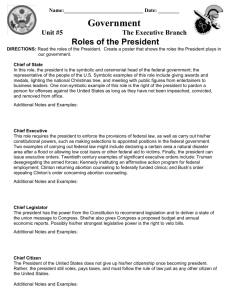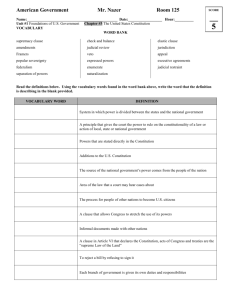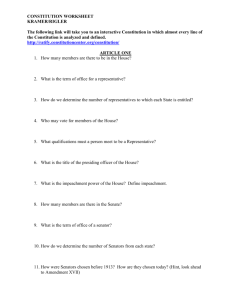Powers of Congress - McGraw-Hill
advertisement

netw rks l There’s More Online! GRAPHIC ORGANIZER Powers of Congress CHART er Legislative Pow Powers of Congress SLIDE SHOW Lesson 2 Powers of Congress ESSENTIAL QUESTION Why do people create, structure, and change governments? It Matters Because The Framers gave Congress many powers and also placed some limits on those powers. Legislative Powers SS.7.C.3.3 Illustrate the structure and function (three branches of government established in Articles I, II, and III with corresponding powers) of government in the United States as established in the Constitution. SS.7.C.3.8 Analyze the structure, functions, and processes of the legislative, executive, and judicial branches. LA.7.1.6.1 The student will use new vocabulary that is introduced and taught directly. GUIDING QUESTION What kinds of lawmaking powers were given to Congress by the PHOTOS: (tc) Getty Images; (tr) CNN/AFP/Getty Images NGSSS covered in “Legislative Powers” Constitution? Have you noticed the rating given to a video game? That rating is required by law. You can thank Congress for that law. Congress has enormous influence over life in the United States. Its decisions affect our nation’s society and economy. Its actions also affect your family and your life. In fact, the actions taken by Congress even affect many people living in other nations. Understanding what powers Congress has—and how those powers are limited—is vital knowledge for every American citizen. Expressed Powers Reading HELP DESK Most of the powers that the Constitution gives to Congress are listed in Article I, Section 8. These powers that are clearly stated in that document are called the expressed powers or the enumerated powers of Congress. There are 18 clauses listing powers specifically given to Congress. Clause 5, for example, says, “The Congress shall have the Power . . . To coin Money.” Content Vocabulary Taking Notes: Identifying Create a graphic organizer similar to the one shown. As you read, write each important power of Congress. SS.7.C.3.3 Powers of Congress • expressed power • enumerated power • implied power • elastic clause • nonlegislative power • impeach Lesson 2 203 POWERS OF CONGRESS SELECTED EXPRESSED POWERS SELECTED IMPLIED POWERS Money Powers s Lay and collect taxes to provide for the defense and general welfare of the United States (Clause 1) s Borrow money (Clause 2) s Establish bankruptcy laws (Clause 4) s Coin, print, and regulate money (Clause 5) s Punish counterfeiters of American currency (Clause 6) s Lay and collect taxes implies the power to support public schools, welfare programs, public housing, etc. s Borrow money implies the power to maintain the Federal Reserve Board Commerce Powers s Regulate commerce implies the power to prohibit discrimination in restaurants, hotels, and other public accommodations s Regulate foreign and interstate commerce (Clause 3) Military and Foreign Policy Powers s Declare war (Clause 11) s Raise, support, and regulate an army and navy (Clauses 12, 13, & 14) s Provide, regulate, and call into service a militia, known as the National Guard (Clauses 15 &16) s Punish acts committed on international waters and against the laws of nations (Clause 10) s Raise and support an army implies the right to draft people into the armed services Other Legislative Powers s Establish laws of naturalization (Clause 4) s Establish post offices and post roads (Clause 7) s Grant copyrights and patents (Clause 8) s Create lower federal courts (Clause 9) s Govern Washington, D.C. (Clause 17) s Provide for laws necessary and proper for carrying out of all other listed powers (Clause 18) s Establish laws of naturalization implies the power to limit the number of immigrants to the United States CHART SKILLS The 18 clauses of Article I, Section 8 of the Constitution spell out the expressed powers of Congress. CRITICAL THINKING 1 Explaining Why is the power to lay and collect taxes the one that the Constitution places in the very first clause? Source: Congress A to Z, 4th ed. (Washington, D.C.: CQ Press 2003.). 2 Synthesizing Why are there no clauses listed for each of the implied powers on the right-hand side of the chart? SS.7.C.3.3 Reading HELP DESK Content Vocabulary (cont.) • writ of habeas corpus • bill of attainder • ex post facto law 204 The Legislative Branch expressed power power that the U.S. Congress has that is specifically listed in the Constitution enumerated power another name for expressed power Implied Powers PHOTO: Getty Images Certain powers are given to Congress even though they are not specifically stated in the Constitution. The source of these powers is Article I, Section 8, Clause 18. This clause says that Congress has the power to do whatever is “necessary and proper” to carry out its expressed powers. The powers that Congress has because of Clause 18 are called implied powers. This means they are not stated directly in the Constitution but can be understood to be granted. Clause 18 is often called the elastic clause because it has allowed Congress to stretch its powers to meet new needs. For instance, the Constitution does not state that Congress has the power to hire millions of people to work in the Defense Department. Under the elastic clause, though, Congress has done just that. It did so as part of its expressed power to support the armed forces. Lawmaking Powers The Constitution gives Congress expressed and implied powers. Setting up a national postal service is one of the expressed powers in Article 1, Section 8, Clause 7. At the time the Constitution was written, there were no electronic forms of communication. ▲ Most of Congress’s powers relate to making laws. As the chart on the powers of Congress shows, many lawmaking powers fall into one of three major categories—money, commerce, and military and foreign policy. Congress has the power to raise and spend money. That includes the power to require people to pay taxes and the power to print money. Congress can also regulate, or manage, commerce that takes place across state lines. Commerce is the business of buying and selling goods and services. Finally, Congress makes laws about defense matters, war, and foreign policy issues. Congress has the power to create and maintain armed forces. Congress alone has the power to declare war. Other lawmaking powers do not fit into these categories. The Constitution also gives Congress the power to create a postal service and a federal court system. In addition, Congress has the power to set up the government of Washington, D.C. CRITICAL THINKING Making Inferences Why do you think this power was considered important enough to be listed as an expressed power in the Constitution? SS.7.C.3.3 PROGRESS CHECK Expressing Why is the “necessary and proper” clause also called the elastic clause? implied power power that Congress has that is not stated explicitly in the Constitution elastic clause clause in Article I, Section 8 of the Constitution that gives Congress the right to make all laws “necessary and proper” to carry out its expressed powers Academic Vocabulary regulate to manage or to control Lesson 2 205 Other Powers and Limits GUIDING QUESTION What powers does Congress have to check the powers of the other branches of government? The most important duty of Congress is to legislate, or make laws. Congress also has a number of duties and responsibilities besides making laws. These powers are called nonlegislative powers. PHOTO: CNN/AFP/Getty Images While the House starts the impeachment process, the actual trial and determination of guilt take place in the Senate. ▲ CRITICAL THINKING Making Inferences After President Bill Clinton was impeached and tried, he was not removed from office. Based on that context information, what do you think acquitted means? LA.7.1.6.3 21st Century SKILLS Critical Thinking: Drawing Inferences and Conclusions Removing a federal official from office is a joint effort of Congress. Only the House can impeach, or accuse, someone. But only the Senate can conduct the trial. Then, a two-thirds vote by the Senate is needed to decide that the official is guilty. Why do you think the impeachment process is used only rarely for top officials? Why does the Constitution involve both houses? SS.7.C.1.7 Reading HELP DESK Nonlegislative Powers One nonlegislative power is the ability of Congress to suggest amendments to the Constitution. Among the most important nonlegislative powers of Congress, though, are those that allow it to check the other branches of government. Some of these are set forth in the Constitution. Others have developed over time. The Senate has the power to approve or reject the president’s nominees for various offices. The offices include Supreme Court justices, federal judges, and ambassadors. The Constitution also allows Congress to remove from office any federal official involved in serious wrongdoing. This action must follow a two-step process. The House has the power to impeach, or accuse officials of misconduct in office. A majority vote of the House is needed to impeach an official. The Senate then holds a trial of the official. The Senate also acts as a jury to decide the official’s guilt or innocence. A two-thirds vote in the Senate is necessary to convict an official and remove him or her from office. The House of Representatives has rarely used its right to impeach. Most often, the power is used for federal judges. Only two presidents have been impeached: Andrew Johnson in 1868 and Bill Clinton in 1998. Both presidents stood trial in the Senate. In both cases, the Senate did not find them guilty. As a result, they were not removed from office. Limits on Congressional Powers The Constitution explains not only what Congress may do but also what it may not do. Some limits are imposed by the Bill of Rights. The purpose of the Bill of Rights was to limit or deny certain powers to the federal government. For example, Congress may not pass laws that restrict freedom of speech or freedom of religion. nonlegislative power duty Congress holds besides lawmaking 206 The Legislative Branch impeach to accuse government officials of misconduct in office The Constitution places other limits on the powers of Congress. Many of these limits are found in Article I, Section 9. For instance, Congress may not favor one state over another, tax interstate commerce, or tax exports. The Framers wanted to be sure to prevent Congress from abusing power. As a result, Section 9 also forbids Congress from passing laws that would hurt the legal rights of individuals. For example, Congress cannot block the writ of habeas corpus (HAY•bee•uhs KAWR•puhs), except in times of rebellion or invasion to protect public safety. This writ is a court order that requires police to bring a prisoner to court to explain why they are holding the person. In addition, Congress cannot pass bills of attainder. These are laws that punish a person without a trial. Congress is also prevented from passing ex post facto laws. These are laws declaring that an act is a crime after the act has been committed. Other limits on the powers of Congress result from the fact that the Constitution sets aside many powers for the state governments. Those powers are denied to the federal government. Congress cannot interfere with these powers, such as the right to regulate public schools. Further limits come from the powers that are given to the other branches to check the powers of Congress. The Supreme Court can declare laws passed by Congress to be unconstitutional. The president can veto, or say no to, bills passed by Congress. This prevents those bills from becoming laws. In this case, Congress has its own check on the power of the president. If both the Senate and the House of Representatives can get a two-thirds vote, they can override the president’s veto. PROGRESS CHECK Considering Why do you think the Constitution forbids Congress from passing ex post facto laws? NGSSS covered in “Other Powers and Limits” SS.7.C.1.7 Describe how the Constitution limits the powers of government through separation of powers and checks and balances. SS.7.C.2.5 Distinguish how the Constitution safeguards and limits individual rights. SS.7.C.3.3 Illustrate the structure and function (three branches of government established in Articles I, II, and III with corresponding powers) of government in the United States as established in the Constitution. SS.7.C.3.8 Analyze the structure, functions, and processes of the legislative, executive, and judicial branches. LA.7.1.6.3 The student will use context clues to determine meanings of unfamiliar words. writ of habeas corpus a court order that requires police to bring a prisoner to court to explain why they are holding the person bill of attainder a law that punishes a person accused of a crime without a trial or a fair hearing in court ex post facto law a law that allows a person to be punished for an action that was not against the law when it was committed LESSON 2 REVIEW Review Vocabulary Answer the Guiding Questions 1. How is the elastic clause related to Congress’s implied powers? LA.7.1.6.1 4. Specifying What are three examples of expressed powers of Congress? SS.7.C.3.3 2. Why do you think that the House rarely impeaches a top government official? SS.7.C.3.8 5. Describing What are two nonlegislative powers given to Congress? SS.7.C.3.3 3. How does preventing Congress from passing a bill of attainder help safeguard rights? SS.7.C.2.5 6. PERSUASIVE WRITING Should representatives always vote as their constituents want, or according to their own best judgment? Write a paragraph in which you express and defend your position. SS.7.C.3.8 Lesson 2 207









